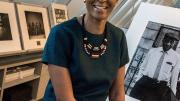At 13, Makeda Best bought her first photo-book: Brian Lanker’s I Dream a World: Portraits of Black Women Who Changed America. (Her second was an Annie Leibovitz collection; after that, lacking funds, she made her own with magazine cutouts.) At 16, she was given her first camera—a Nikon 6600, then the fastest automatic on the market—and began taking portraits. It was the only genre she knew before college, at Barnard, exposed her to other formats: “I didn’t know what photography could be.” Later, as a student at CalArts, she mostly snapped unpeopled landscapes, especially in San Francisco, its storefronts roiled by the dot.com boom. Best had been raised there by New Yorker parents who’d struck out west in the 1970s. To her mind, “California’s a place where people escape. It’s a place where you go because want to think freely, you want to be expansive. The East Coast is very much grounded in history.” Though she got her M.F.A., Best says, “I have nothing to show” for that time in art school. There’s no framed work, no secret box of prints—just an enduring fascination with the form’s technical aspects, which she brings to her new position as Menschel curator of photography at the Harvard Art Museums. Documentary is a special strength of the collection; Best, Ph.D. ’10, specializes in the photography of war and protest. Centrally, she’s interested in how artists struggle to capture their moment, grappling with new cameras and films. “That’s where my own background as a photographer comes in,” she says. “I can look at something and say, ‘Well, he’s trying to do this, but it’s not quite there.’” She no longer makes images, but her life is still dedicated to understanding that process: “It’s become a practice, now, of writing, of reading.”
Profile of photography curator Makeda Best
Profile of photography curator Makeda Best
Focusing on the Harvard Art Museums’ new photography curator

Makeda Best
Photograph by Jim Harrison
You might also like
These Harvard Mountaineers Braved Denali’s Wall of Ice
John Graham’s Denali Diary documents a dangerous and historic climb.
How a Harvard Hockey Legend Became a Needlepoint Artist
Joe Bertagna’s retirement project recreates figures from Boston sports history.
This TikTok Artist Combines Monsters and Mental Heath
Ava Jinying Salzman’s artwork helps people process difficult feelings.
Most popular
Explore More From Current Issue

Bees and Flowers Are Falling Out of Sync
Scientists are revisiting an old way of thinking about extinction.

How a Harvard and Lesley Group Broke Choir Singing Wide Open
Cambridge Common Voices draws on principles of universal design.






